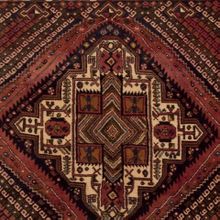Difference between revisions of "Shahr-e-babak Rug"
Jump to navigation
Jump to search
m (Lotus moved page Shahrbabak Rug to Shahr-e-babak Rug without leaving a redirect) |
|||
| Line 1: | Line 1: | ||
| − | + | {{Infobox Rug and Carpet | |
| + | |above = | ||
| + | |image = [[File:Shahr-e-babak-Rugs-Rugman-Collection.jpg|frameless|220px]] | ||
| − | + | |caption = Design of Shahr-e-babak Rug ([https://www.rugman.com/carpet-design/shahre-babak-rugs/ Rugman]) | |
| − | = | + | |image2 = |
| + | |caption2 = | ||
| − | + | <!--General information--> | |
| − | === | + | |Name = Shahr-e-babak Rug |
| + | |Original name = قالی شهربابک | ||
| + | |Alternative names = Shahr-e-babak Carpet | ||
| − | === | + | |Origin = {{flag|Iran}}: |
| + | |Category = City rug | ||
| + | |Prime examples = | ||
| + | |Master designers = | ||
| − | = | + | |To know more = |
| − | === | + | <!--Technical information--> |
| + | |Common designs = | ||
| + | |Common motifs & patterns = | ||
| + | |Common sizes = | ||
| + | |Common colors = | ||
| + | |Dyeing method = Natural, synthetic | ||
| + | |Pile material = | ||
| + | |Foundation material = | ||
| + | |Weaving Technique = | ||
| + | |Knot type = | ||
| + | |Knot density = | ||
| − | = | + | |additional info = |
| + | }} | ||
| + | From the city of that name in southern Persia, the incredible Kerman carpet is a soft treasure, and among the most beautiful designs woven. The traditional motif has the main border and central medallion in an intricately-detailed, ornate architectural or floral theme in the palest pastels with white-and-gold trim. This typically contrasts with an open field of a rich solid cranberry red, navy blue or other strong colors. Others patterns include the finer Lavar style with garden, tree-of-life, vase and all-over mille fleur designs, or the many pictorials which tell the story of a significant figure or event in history. Silk is almost never used.{{citation needed}} | ||
| − | + | <!-- from Rugman Archive:https://web.archive.org/web/20080712080022/http://www.rugman.com:80/AreaRugs/ShahrBabak-AreaRug-1700410035.html --> | |
| − | |||
| − | |||
| − | |||
| − | |||
| − | |||
| − | |||
| − | |||
| − | </ | ||
| − | |||
| − | |||
| − | |||
| − | |||
| − | |||
| − | |||
| − | + | [[Category:Persian Rug and Carpet]] | |
| + | [[Category:Rug and Carpet]] | ||
| + | [[fa:قالی_شهر_بابک]] | ||
Revision as of 11:21, 29 August 2019
| Shahr-e-babak Rug | |
|---|---|
 Design of Shahr-e-babak Rug (Rugman) | |
| General information | |
| Name | Shahr-e-babak Rug |
| Original name | قالی شهربابک |
| Alternative name(s) | Shahr-e-babak Carpet |
| Origin | |
| Category | City rug |
| Technical information | |
| Dyeing method | Natural, synthetic |
From the city of that name in southern Persia, the incredible Kerman carpet is a soft treasure, and among the most beautiful designs woven. The traditional motif has the main border and central medallion in an intricately-detailed, ornate architectural or floral theme in the palest pastels with white-and-gold trim. This typically contrasts with an open field of a rich solid cranberry red, navy blue or other strong colors. Others patterns include the finer Lavar style with garden, tree-of-life, vase and all-over mille fleur designs, or the many pictorials which tell the story of a significant figure or event in history. Silk is almost never used.[citation needed]